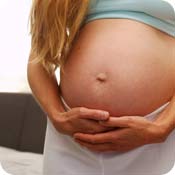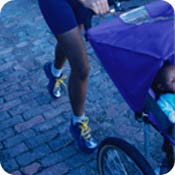 Hip pain is a common source of frustration during pregnancy. The weight gain from pregnancy is distributed unevenly and it's up to the hips and lower back to make adjustments. In addition to the weight gain, Mother Nature prepares the body for delivery by releasing hormones that relax the ligaments that support your joints. This extra elasticity is great for the flexibility needed for giving birth, but it can lead to additional discomfort as you increase in size and weight.
Hip pain is a common source of frustration during pregnancy. The weight gain from pregnancy is distributed unevenly and it's up to the hips and lower back to make adjustments. In addition to the weight gain, Mother Nature prepares the body for delivery by releasing hormones that relax the ligaments that support your joints. This extra elasticity is great for the flexibility needed for giving birth, but it can lead to additional discomfort as you increase in size and weight.
Now for the good news! Most studies show that hip pain may be avoided by exercising and using a proper conditioning program. There are also some rather simple things that you can do to relieve some of the discomfort.
- Find a sleeping posture that supports the joints around your hips and pelvis. Many women find relief by lying on their side with a pillow between their knees and another supporting the belly.
- Avoid sitting with your legs crossed and try using a rolled up towel or small cushion to support the arch of your lower back. This is especially helpful if you are sitting for long periods. You may also use a foot rest. Your legs may be most comfortable when spread apart because of the size of your growing belly.
- Use exercises such as walking and swimming to strengthen your muscles. This will prevent some of the pain by preparing the body to support the extra weight gain.
- Stretch frequently, especially the hamstrings, piriformis, heel cords and low back, which tend to tighten the most from postural changes that occur.
- Take classes like Pilates or Yoga for pregnant women. These are great forms of exercise that will keep you flexible and strong.
- Avoid any activities that might aggravate the pain. If the pain continues you may want to check with an obstetric physiotherapist.
- Wear a prenatal belt/sacroiliac belt to help stabilize your hips and pelvis. It's especially helpful to tolerate weight-bearing exercise more in late pregnancy.
- Always incorporate pelvic floor and abdominal exercises into your pregnancy routine to help stabilize and support your growing belly. This will help take the stress off your hips some because your pelvic floor will be able to support the growing uterus. Your strong abs will counteract the strong postural changes.
Remember to take care of those hips and you'll benefit from a happier pregnancy!
Some women experience a rare but painful problem during pregnancy called Pelvic Girdle Pain (PGP) (formerly known as Symphysis Pubis Dysfunction or SPD). The most common symptoms are pain and instability in the pelvic region, especially during activity.
This article has been reviewed by Sara Hambidge, Physical Therapist.
|
 Hip pain is a common source of frustration during pregnancy. The weight gain from pregnancy is distributed unevenly and it's up to the hips and lower back to make adjustments. In addition to the weight gain, Mother Nature prepares the body for delivery by releasing hormones that relax the ligaments that support your joints. This extra elasticity is great for the flexibility needed for giving birth, but it can lead to additional discomfort as you increase in size and weight.
Hip pain is a common source of frustration during pregnancy. The weight gain from pregnancy is distributed unevenly and it's up to the hips and lower back to make adjustments. In addition to the weight gain, Mother Nature prepares the body for delivery by releasing hormones that relax the ligaments that support your joints. This extra elasticity is great for the flexibility needed for giving birth, but it can lead to additional discomfort as you increase in size and weight. 





Member Comments